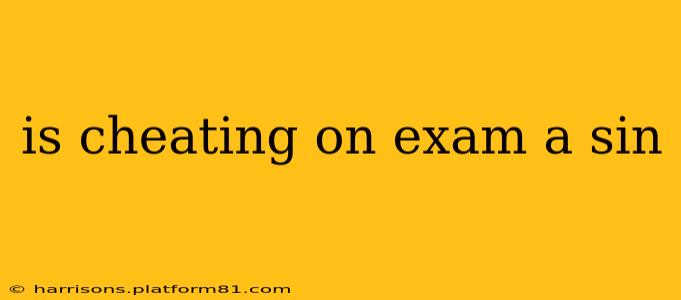Is Cheating on an Exam a Sin? Exploring Morality, Ethics, and Consequences
Cheating on an exam is a complex issue that transcends simple right and wrong. While many religious and ethical frameworks condemn dishonesty, understanding the nuances behind this act reveals a deeper moral dilemma. This exploration will delve into the religious, ethical, and practical implications of cheating on exams, addressing common questions and concerns.
What are the religious perspectives on cheating?
Most major religions emphasize honesty and integrity. Christianity, Islam, Judaism, and Buddhism all condemn dishonesty as a violation of moral principles. Within these faiths, cheating is often viewed as a breach of trust, a form of stealing (intellectual property, grades, etc.), and a lack of respect for oneself and others. The specific consequences of this sin vary within each religious tradition, but the underlying condemnation of dishonesty remains consistent. For example, the Ten Commandments' prohibition against bearing false witness extends to acts of deception, such as cheating.
Is cheating on a test morally wrong, even if it doesn't hurt anyone?
Even if the immediate consequences of cheating seem minimal, it's still morally problematic. The act itself undermines the principles of fairness, integrity, and hard work. It creates an uneven playing field, disadvantaging those who strive to achieve honestly. Furthermore, the act of cheating can erode one's own self-respect and sense of accomplishment, potentially leading to further ethical compromises in the future. The inherent dishonesty involved weakens the individual's moral character, regardless of external consequences.
What are the consequences of cheating on an exam?
The ramifications of cheating extend beyond the immediate academic setting. Consequences can include:
- Failing the exam or course: The most immediate consequence is a failing grade, impacting GPA and potentially future academic prospects.
- Suspension or expulsion from school: Depending on the institution's policies, severe cases of cheating can lead to serious disciplinary actions.
- Damage to reputation: A reputation for dishonesty can significantly hinder future opportunities, impacting job applications, scholarships, and personal relationships.
- Legal ramifications: In extreme cases, particularly involving large-scale cheating schemes, legal repercussions might follow.
Is it cheating if I look at someone else's paper briefly?
Even a brief glance at another student's paper constitutes cheating. The intent to gain an unfair advantage is what defines the act. This act undermines the integrity of the assessment and is a violation of academic honesty policies.
How can I avoid cheating on exams?
Avoiding cheating requires proactive measures:
- Effective Study Habits: Develop strong study skills and time management techniques to ensure you're well-prepared for exams.
- Seeking Help When Needed: Don't hesitate to ask teachers or tutors for clarification or assistance if you're struggling with the material.
- Understanding Academic Integrity Policies: Familiarize yourself with your institution's policies on academic honesty.
- Maintaining Ethical Standards: Upholding high ethical standards is crucial for building character and ensuring personal integrity.
In conclusion, while the specific religious or legal consequences of cheating may vary, the fundamental ethical implications remain undeniable. Cheating compromises personal integrity, undermines fairness, and can have serious long-term repercussions. The focus should be on honest academic practice built on integrity and a commitment to personal excellence.
